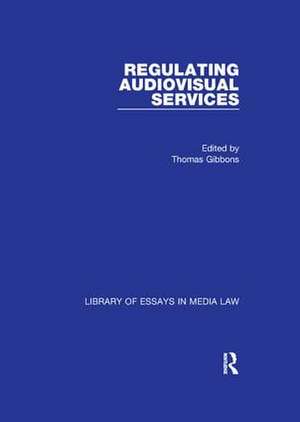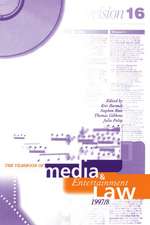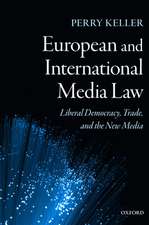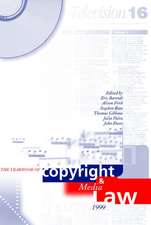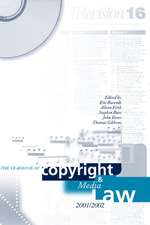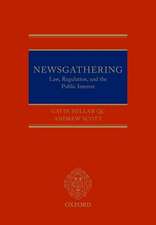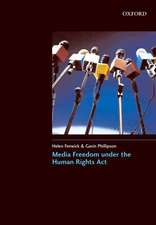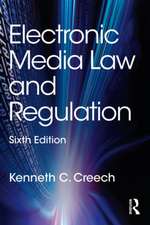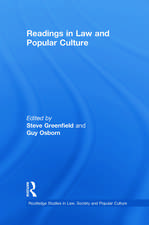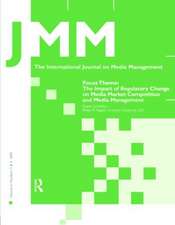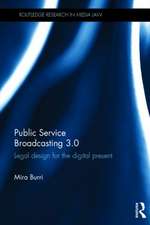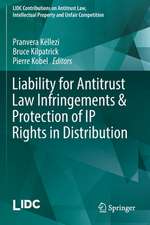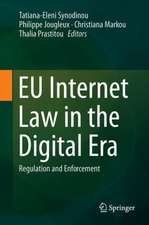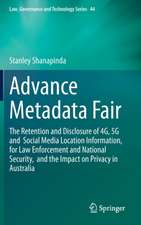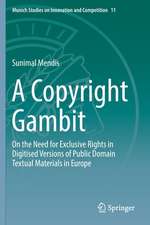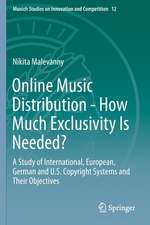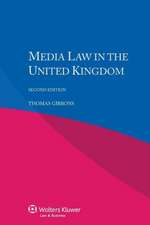Regulating Audiovisual Services: Library of Essays in Media Law
Editat de Thomas Gibbonsen Limba Engleză Paperback – 12 iun 2019
| Toate formatele și edițiile | Preț | Express |
|---|---|---|
| Paperback (1) | 314.10 lei 6-8 săpt. | |
| Taylor & Francis – 12 iun 2019 | 314.10 lei 6-8 săpt. | |
| Hardback (1) | 1838.64 lei 6-8 săpt. | |
| Taylor & Francis – 7 oct 2009 | 1838.64 lei 6-8 săpt. |
Preț: 314.10 lei
Preț vechi: 348.90 lei
-10% Nou
Puncte Express: 471
Preț estimativ în valută:
60.12€ • 62.53$ • 50.38£
60.12€ • 62.53$ • 50.38£
Carte tipărită la comandă
Livrare economică 13-27 martie
Preluare comenzi: 021 569.72.76
Specificații
ISBN-13: 9781138378506
ISBN-10: 113837850X
Pagini: 622
Dimensiuni: 169 x 244 mm
Greutate: 1.15 kg
Ediția:1
Editura: Taylor & Francis
Colecția Routledge
Seria Library of Essays in Media Law
Locul publicării:Oxford, United Kingdom
ISBN-10: 113837850X
Pagini: 622
Dimensiuni: 169 x 244 mm
Greutate: 1.15 kg
Ediția:1
Editura: Taylor & Francis
Colecția Routledge
Seria Library of Essays in Media Law
Locul publicării:Oxford, United Kingdom
Cuprins
Contents: Introduction; Part I Convergence and Regulation: New challenges for European multimedia policy: a German perspective, Wolfgang Hoffmann-Riem; Regulatory convergence? Douglas W. Vick. Part II Techniques of Regulation: Television and the public interest, Cass R. Sunstein; Self regulation and the media, Angela J. Campbell; Controlling the new media: hybrid responses to new forms of power, Andrew Murray and Colin Scott; Shielding children: the European way, Michael D. Birnhack and Jacob H. Rowbottom. Part III Structural Regulation: Media Concentration and Ownership: Rethinking European Union competence in the field of media ownership: the internal market, fundamental rights and European citizenship, Rachael Craufurd Smith; The goal of pluralism and the ownership rules for private broadcasting in Germany: re-regulation or de-regulation? Peter Humphreys; Architectural censorship and the FCC, Christopher S. Yoo; Media structure, ownership policy, and the 1st Amendment, C. Edwin Baker; Control over technical bottlenecks - a case for media ownership law?, Thomas Gibbons. Part IV Issues in Regulating New Media: The regulation of interactive television in the United States and the European Union, Hernan Galperin and François Bar; The 'right to information' and digital broadcasting: about monsters, invisible men and the future of European broadcasting regulation, Natali Helberger; Access to content by new media platforms: a review of the competition law problems, Damien Geradin; Television as something special? Content control technologies and free-to-air TV, Andrew T. Kenyon and Robin Wright; Yahoo! Cyber-collision of cultures: who regulates?, Horatia Muir Watt; Spectrum auctions: yesterday's heresy, today's orthodoxy, tomorrow's anachronism: taking the next step to open spectrum access, Eli Noam; Spectrum flash dance: Eli Noam's proposal for 'open access' to radio waves, Thomas W. Hazlett; Name Index.
Notă biografică
Thomas Gibbons is a Professor in the Department of Law at University of Manchester, UK
Descriere
The adoption of digital technology has resulted in the convergence of broadcasting, cable, satellite, the Internet and mobile telephony, enabling each of them to deliver the same kinds of content and allowing users to exercise much greater choice over the kind of material that they receive and when they receive it. The essays in this volume examine issues that have arisen from the changing nature of audiovisual services and their impact on regulatory policy and practice.
